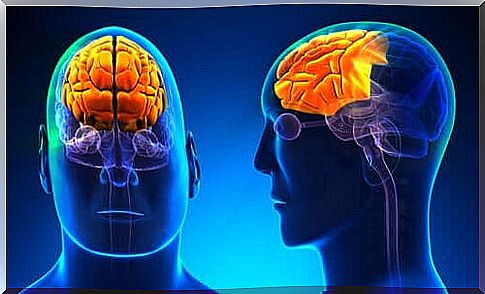The Neurobiology Behind Alcoholism

Just as there are neuroanatomical and neurofunctional frameworks to explain human behavior, we also have the neurobiology behind alcoholism. In this article, we will explain what happens in the brain of a person with an alcohol addiction.
Alcohol is the most widely used legal drug. It has a great social and economic burden in society and is capable of creating physical and psychological dependence. According to the WHO, alcoholism affects 140 million people worldwide and is the fifth most common cause of premature death.
There are many diseases and conditions associated with alcohol consumption, from tuberculosis to HIV and infections. What happens in the brain after consuming alcohol and especially when there is a problem with addiction? This is where the neurobiology behind alcoholism comes into the picture.
The neurobiology behind alcoholism explained
The cause and development of alcoholism involves a complex interaction between biological, psychological, social and environmental factors.
The most reliable predictors of a person becoming addicted are genetic or inherited factors. The innate disposition of a person to suffer from alcoholism covers up to 60% of cases of alcoholism.

From a biochemical point of view, the risk of an alcohol dependence is related to variations in genes that encode protein made up of two enzymes in particular: alcohol dehydrogenase and aldehyde dehydrogenase.
However, in addition to the possible hereditary origin, scientists claim other possible neurobiological cases, such as a decrease in the level of the MAO-A enzyme (mono-amino-oxidase type A), which some individuals experience after undergoing traumatic events.
Of course, there are other possible explanations for the cause of more normal types of behavioral alcoholism. These have to do with learning experiences and personal traits. The effects are the same, but at a different level than the neurobiological one. At the same time , however , there is a direct connection.
Hormones and neurotransmitters in the neurobiology behind alcoholism
Scientists have shown that alcohol can interact with a wide range of neurotransmitters in the nervous system in either a direct or indirect way. This interaction occurs due to the fat-soluble nature of ethanol, which allows it to cross the blood-brain barrier and thus reach the brain.
Neurotransmitters and hormones susceptible to interacting with ethyl alcohol are the following:
- GABA
- Glutamate
- Endogenous epioids
- Dopamine
- Adrenaline and noradrenaline
- Acetylcholine
- Serotonin
- Cannabinoids
- Corticotropin-releasing hormones
- Neuropeptide Y

Alcohol dependence is a deficit in the physiological ability of our endogenous motivation and reward system. Several brain structures are responsible for these systems, which influence human behavior. Systems such as the limbic system, the tonsil nucleus, the hippocampus, the caudate nucleus, the accumbens nucleus and the forehead lobe.
A dysfunction in the aforementioned systems may be associated with alcohol dependence, alcohol poisoning or symptoms of relapse.
The effects of alcoholism
Intake of alcohol produces a non-inhibitory effect and a calming effect on the central nervous system.
The latter is characterized by a blockage and change in the brain structure, as well as the processes that are associated with thinking, reflecting and ethical values, among other things. In addition, it promotes impulsivity and the uncontrolled display of certain emotions.
In this way, some very relevant cognitive functions are more or less permanently affected. These include the executive functions (cognitive processes related to behavior) of the anterior lobes, memory problems, decreased visuospatial ability, and problems with motor control.
The non-inhibitory effect
The non-inhibitory effect of alcohol causes the person to behave in a way they would not do if they were sober. Alcohol can cause a temporary feeling of freedom, empathy and heightened emotions.
In general, the development of alcoholism can be explained by the effects of positive reinforcement that alcohol intake produces in the brain. The intake of this substance activates the brain’s reward system and creates a feeling of pleasure, which makes the brain want to consume more.
There are many sources of help and support available for people suffering from alcoholism. The best first step is to go to a doctor to begin the process of stopping the addiction.
As you can see, the neurobiology behind alcoholism explains how and when alcohol abuse occurs. “Why” is much harder to explain. However, we must hope that the many existing approaches can be a great help to the people suffering from this terrible addiction.









